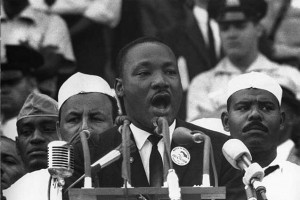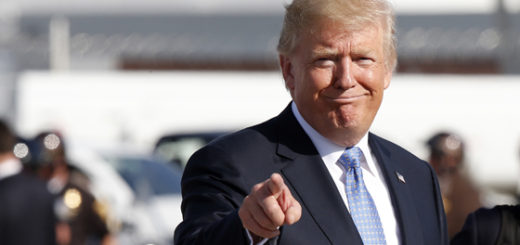Rev. Jeremiah Wright should re-listen to Rev. Martin Luther King.
Author’s note: This piece makes little sense absent the audio clips that are a part of it. To get the entire meaning of this post, either click on the “Listen here” links when they appear in the text, or listen to the spoken broadcast of this post on Newstalk 600 KTBB as it aired on Friday, Apr. 4, 2008. The link to that broadcast is immediately below.
Click here to listen to the broadcast of You Tell Me on Newstalk 600 KTBB in Tyler, Texas, Friday, Apr. 4, 2008.
Forty years ago today, if you were listening to KTBB you would have heard, among other things, the following clips: Listen here.
Today marks the 40th anniversary of the day in which Martin Luther King was cut down by a sniper. Landmark anniversaries are divisible by five. This landmark anniversary, coming as it does on the heels of the Rev. Jeremiah Wright episode, is, in my opinion, particularly significant in this campaign year.
I would be shocked if Rev. Wright did not hold himself out to be an admirer of Martin Luther King. I’m certain that Rev. Wright happily wraps himself in an apostolic cloth of Martin Luther King-borne legitimacy.
Among many very incendiary statements that Rev. Wright made in the pulpit of Trinity United Church of Christ he said this: Listen here.
I’m a middle-aged white guy. So maybe I just don’t understand. But you have to ask yourself; Would Martin Luther King want Jeremiah Wright on his team today? Is Jeremiah Wright a true acolyte of Martin Luther King? To consider these questions, it’s necessary to re-listen to Dr. King’s speech on the steps of the Lincoln Memorial, Aug. 28, 1963. It’s a speech that will live for generations as one of the finest pieces of oratory ever.
Here’s a one-minute edited montage: Listen here.
“We will be able to transform the jangling discords of our nation into a beautiful symphony of brotherhood.” If Martin Luther King, growing up in the segregated south when he did, could learn the king’s English, every kid in America should be able to today. But I digress.
Martin Luther King’s speech was a statement of grievance. Don’t think it wasn’t. He went down the list. But in tone and conclusion, it was optimistic and hopeful. It called upon our better angels. And it was effective because it not only spoke to black people, it touched the hearts of white people. And we began that day the long and still unfinished process of getting better as a nation.
So Rev. Wright, if you want to claim the mantle of Dr. Martin Luther King, shut up and read his speech. Make his life worthy of the price he paid 40 years ago today.
(Related commentary in this article by Juan Williams in The Wall Street Journal here.)









I believe that “white” America has embraced only part of the whole that was Dr. King; the part that
was eloquent,loving, reconcilliatory, forgiving of past injustices and they continue to judge all black people to this very high standard; dismissing their anger as hate and using Dr. King as a yard stick with which they are often beaten. But Dr. King was also a very angry black man,
Consider the following “God didn’t call American to do what she’s doing in the world now. God didn’t call America to engage in a senseless, unjust war …… And we are criminals in that war. We have committed more war crimes almost than any other nation in the world and we won’t stop because of our pride, our arrogance as a nation” unAmerican ? even today those words would generate controversy. The difference between Dr King and Jeremiah Wright is that Wright cannot capture the sheer majesty of Kings eloquence ( few can, not even Obama ) and instead he just comes across as angry. But do not be fooled, do not close your ears to what is being said – the anger that existed in the 60’s still exists, it was never addressed and has been allowed to fester to the point of destuctiveness ( particularly for the black community), neither be afraid and mistake anger for hate.
In the era when Dr. King lived, America had a problem with racism and hatred. But notice I said, in the ERA. In today’s America, we do not have signs that designate white or colored water fountains, we do not have white or colored designated schools, and colored individuals do not have to move to the back of the bus. In today’s America, EVERY SINGLE AMERICAN CITIZEN has the right to vote, free speech, to attend the public school of their choice, sit anywhere on the bus, and have all the rights that their fellow American does. Although there are still a FEW that decide to hate, WE DO NOT STILL LIVE IN THE 60’S. There are some people who try to hang on to the old way of thinking, but America HAS CHANGED.
Look at who is running for president. We have a White Man, A Black Man, And A White Woman. I REPEAT, WE DO NOT LIVE IN THE 60’S ANYMORE. I am tired of RACIST people OF ALL COLOR, claiming that America has a Racist Cancer. Sorry to bust your bubble, but it doesn’t.
I strongly believe that people like Jeremiah Wright are more racist than the people they are pointing the figure at. You can’t fix Hate with more Hate.
I’M TIRED OF FEELING GUILTY FOR BEING WHITE !!!
I have a child with Down syndrome. America has come a long way from how they think of people with disabilities. People with disablities were discrimated against in past. We are still advocating for their civil rights today! I am not angry today about how people with disabilites were discrimated in the past. I focus on TODAY and tomorrow.
I refuse to apologize for being white. I refuse to be held accountable for all the wrong doings in the black community. I believe that blacks are responsible for their own actions. Same goes for every American.
Obama said, The ‘white community,’ said Barack, must start ‘acknowledging that what ails the African-American community does not just exist in the minds of black people; that the legacy of discrimination — and current incidents of discrimination, while less overt than in the past — are real and must be addressed. Not just with words, but with deeds … .’
What else must we white Americans do for them? We have spent trillions of dollars in the black community since the 1960’s. Where is the gratitude? All I hear are complaints.
Enough is enough. Be a responsible American and take care of yourself – we don’t need men like Rev. Wright constantly stirring the pot of racism.
OMG….
who is this Heidi lady..
frankly she sounds like she is stuck in 1958…
the racism that she spouts is truly offensive…
does she even know any “blacks”
very sad that she has so much hate in her heart and is lost from Christ.
In case you didn’t know, even though there is equality under the law, discrimination still exists even today. Anyone who is NOT aware of that, is frankly an idiot.